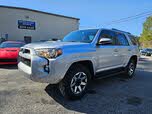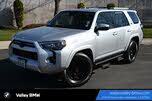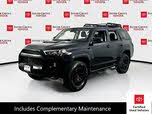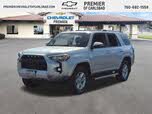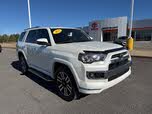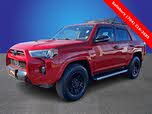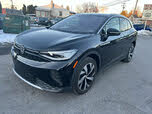2021 Toyota 4Runner vs 2021 Volkswagen ID.4
Overview | ||
MSRP | $36,765 | $39,995 |
Average price | $39,464 | $21,895 |
Listings | ||
Ratings & Reviews | ||
User reviews | ||
Expert reviews | 6.2 out of 10Read full review | 7.3 out of 10Read full review |
Pros & cons | Pros
| Pros
|
Summary | Despite its design age, poor fuel economy, rough ride, iffy handling, and marginal safety ratings, the current-generation Toyota 4Runner remains a popular choice in a midsize SUV. Why? Its reputation for reliability and resale value, coupled with its undeniable utility, rugged image, and go-anywhere and do-anything capability, are the selling points. And if that's why you want a 2021 Toyota 4Runner, it won't disappoint you as long as you accept its shortcomings. | The “Dieselgate” emissions scandal forced Volkswagen to double down on electric cars, and now we’re finally seeing the first result of that: the 2021 Volkswagen ID.4 electric crossover. VW has made an electric car before, but its last attempt, the e-Golf, was built to satisfy emissions standards, not rack up sales. It was barely advertised, and it was sold only in certain states. That’s not the case with the ID.4, which will be available nationwide and will even be built in Tennessee starting in 2022. Volkswagen views the ID.4 as a rival not to other EVs, but to mainstream gasoline vehicles like the Honda CR-V and Toyota RAV4. Being late to the party means there are already several other EVs trying to coax new-car buyers away from internal combustion, however. If you want a reasonably-priced EV, the Nissan Leaf, Hyundai Kona Electric, and Kia Niro EV already exist, and General Motors just announced the 2022 Chevrolet Bolt EUV—a new variant of the Chevy Bolt EV with a crossover body style similar to the Volkswagen. We tested an ID.4 1st Edition, which commemorates the car’s launch, and an ID.4 PRO S with all-wheel drive (AWD). The 1st Edition is a limited-edition model that has already sold out, but it’s mechanically identical to the ID.4 Pro S AWD, albeit with power sent only to the rear wheels. |
Video | No video found | |
Popular Features & Specs | ||
Engine | 4.0L 270 hp V6 | 201 hp Electric |
Drive Train | 4X2 | RWD |
Seating Capacity | 7 | 5 |
Horsepower | 270 hp @ 5600 rpm | |
EV Battery Capacity | 82 kWh | |
MPG City | 16 | 104 |
MPG Highway | 19 | 89 |
Battery Charge Time (240V) | 8 hours | |
Engine | ||
Engine Name | 4.0L 270 hp V6 | 201 hp Electric |
Torque | 278 lb-ft @ 4400 rpm | |
Horsepower | 270 hp @ 5600 rpm | |
Battery Charge Time (240V) | 8 hours | |
Drivetrain | 4X2 | RWD |
Fuel Economy | ||
EV Battery Capacity | 82 kWh | |
MPG City | 16 | 104 |
MPG Highway | 19 | 89 |
Interior | ||
Seating Capacity | 7 | 5 |
Safety | ||
Front Crash Overall | 4 | 5 |
Side Crash Overall | 5 | 5 |
Dimensions & Capacity | ||
Cargo Space | 47.2 cu ft | 30.3 cu ft |
Curb Weight | 4400 lbs | 4517 lbs |
Height | 71.5 in | 64.4 in |
Length | 190.2 in | 180.5 in |
Width | 75.8 in | 72.9 in |
Wheelbase | 109.8 in | 108.9 in |
Maximum Payload | 1700 lbs | 1347 lbs |
Number of doors | 4 | 4 |
Maximum Towing Capacity | 5000 lbs | |
Standard Towing Capacity | 5000 lbs | |
The 2021 Toyota 4Runner had not seen a major redesign in over a decade, though it had received periodic updates. Despite its age, the 4Runner's design remained functional and appealing to those who valued utility over aesthetics. The SUV's two-box body, flared fenders, and trapezoidal wheel arches gave it a balanced and timeless look. The 4Runner was available in several trims, including SR5, TRD Off-Road, Limited, and TRD Pro, with special editions like the Trail Special Edition, which was priced at $38,565 MSRP for the RWD model. The Trail Special Edition featured black cloth upholstery, all-weather floor mats, and a custom-made cooler.
Inside, the 4Runner's interior was dominated by hard plastic, which was easy to clean and in line with the SUV's rugged mission. The dashboard was old-school, with large knobs and buttons, and manual air conditioning. The 4Runner required a traditional key to start, a rarity in modern vehicles. These characteristics endeared the 4Runner to its owners, as it represented a simple, durable vehicle that could last for decades, provided gasoline remained available.
The 2021 Volkswagen ID.4 was designed from the ground up as an electric vehicle (EV), featuring a distinctive look that set it apart from Volkswagen's gasoline models. The ID.4 had a streamlined profile with wheels pushed out to the corners, giving it a unique appearance. It was based on VW's EV-specific MEB platform and followed the European-market ID.3 hatchback. The ID.4's interior design blended Volkswagen's minimalism with a smartphone aesthetic, featuring piano black and matte plastic materials. The base ID.4 Pro came with a leather-wrapped steering wheel and cloth seats, while the Pro S and 1st Edition models had leatherette upholstery.
The ID.4's interior felt spacious, with good forward visibility despite the steeply-raked windshield. However, rearward visibility was hindered by thick rear pillars and a small back window. The ID.4 did not have a "frunk" for extra cargo storage, but VW claimed this decision allowed for more cabin space. The console was narrow and close to the floor, providing limited storage space for larger items. The ID.4's seats were comfortable, but the driver's seat lacked thigh support, which could be uncomfortable for long drives.
The 2021 Toyota 4Runner was equipped with a 4.0-liter V6 engine producing 270 horsepower and 278 pound-feet of torque, paired with a five-speed automatic transmission. The Trail Special Edition we tested performed admirably off-road, thanks to its A-Trac off-road traction control system. The 4Runner tackled mud, hills, and ruts with ease, and higher trims like the TRD Off-Road and TRD Pro offered additional off-road features such as a locking rear differential, Multi-Terrain Select, and Crawl Control. However, on pavement, the 4Runner felt slow, heavy, and clunky, with poor fuel efficiency averaging 16.8 mpg.
The 2021 Volkswagen ID.4 launched with a single rear-mounted electric motor producing 201 horsepower and 229 pound-feet of torque, powered by an 82-kilowatt-hour battery pack. An all-wheel-drive (AWD) version with a second electric motor arrived later in 2021, increasing power output to 295 horsepower and 339 pound-feet of torque. The ID.4's rear-wheel-drive (RWD) setup provided balanced handling, and the instantaneous torque made acceleration fun. The AWD version offered better performance on twisty roads, but the ID.4 was tuned for comfort rather than sporty handling. Unlike many EVs, the ID.4 did not offer aggressive regenerative braking for one-pedal driving, opting for a more traditional driving experience.
The 2021 Toyota 4Runner's high ground clearance could be challenging for shorter passengers to climb aboard, but once inside, the seats were comfortable and supportive. The rear seats offered ample legroom, good visibility, air conditioning vents, and USB charging ports. The 4Runner's cargo space measured up to 47.2 cubic feet behind the rear seats and 89.7 cubic feet with the seats folded down. The Trail Special Edition featured a sliding cargo deck that could hold up to 440 pounds, and the back bumper served as a convenient spot for various activities.
The 2021 Volkswagen ID.4 offered more front and rear headroom than many competitor EVs, though legroom was average for the segment. The ID.4 provided 30.3 cubic feet of cargo space with the rear seats in place and 64.2 cubic feet with the seats folded. While it lacked a "frunk," the interior felt spacious, and the forward visibility was good. The console was narrow, limiting storage space for larger items, but there were plenty of places to store smaller items like phones. The ID.4's seats were comfortable, but the driver's seat lacked thigh support, which could be uncomfortable for long drives.
The 2021 Toyota 4Runner Trail Special Edition came with an 8-inch touchscreen infotainment system featuring Bluetooth, Apple CarPlay, Android Auto, Amazon Alexa compatibility, SiriusXM satellite radio, and five USB ports. The premium audio upgrade added dynamic navigation, dynamic point-of-interest search, and dynamic voice recognition, along with a one-year subscription to Destination Assist concierge services. The system was user-friendly, with physical shortcut buttons and knobs that could be operated while wearing gloves.
The 2021 Volkswagen ID.4's standard infotainment system included a 10-inch touchscreen (with an optional 12-inch screen) and wireless Apple CarPlay and Android Auto. A 5.3-inch display screen served as the instrument cluster, and haptic touchpads replaced most switchgear. While the setup looked modern, it was difficult to use due to the lack of tactile feedback. The ID.4 also featured a natural-language voice-control system and ID.Light, a light strip at the base of the windshield that communicated information to the driver. The touchscreen was well-positioned, with smart-looking graphics and easy-to-navigate menus.
The 2021 Toyota 4Runner came with Toyota Safety Sense P (TSS-P), which included adaptive cruise control, forward-collision warning, automatic forward emergency braking, lane departure warning, and automatic high-beam headlights. However, it lacked a blind-spot warning system and rear cross-traffic warning. The 4Runner received a three-star rollover resistance rating from the National Highway Traffic Safety Administration (NHTSA) and a "Good" roof crush strength rating from the Insurance Institute for Highway Safety (IIHS). However, its protection for the driver in a small overlap frontal-impact collision was rated as Marginal by the IIHS, and the NHTSA gave the front passenger protection a three-star rating in a frontal-impact crash.
The 2021 Volkswagen ID.4 received the highest-level Top Safety Pick+ designation from the IIHS and a five-star rating from the NHTSA for the RWD model. The standard safety features included forward-collision warning, automatic emergency braking, blind-spot monitoring, lane-keep assist, park distance control, automatic high beams, and adaptive cruise control. The ID.4 also introduced Travel Assist, which added automated lane centering to the adaptive cruise control, and Emergency Assist, which brought the car to a stop if the driver was incapacitated. Travel Assist performed well, smoothly following curves and responding well to acceleration and deceleration.
CarGurus highlights

According to CarGurus experts, the overall rating for the 2021 Toyota 4Runner is 6.2 out of 10, while the 2021 Volkswagen ID.4 scores 7.3 out of 10. Based on these ratings, the 2021 Volkswagen ID.4 is the better choice, offering a more modern design, advanced safety features, and a higher overall rating.
Choose the 2021 Toyota 4Runner if:
Shop Now- You need a rugged, off-road-capable SUV with a proven track record.
- You value a simple, durable vehicle that can last for decades.
- You require ample cargo space and a functional interior for outdoor activities.
Choose the 2021 Volkswagen ID.4 if:
Shop Now- You want a modern, all-electric vehicle with a distinctive design.
- You prioritize advanced safety features and high safety ratings.
- You prefer a spacious interior with a user-friendly infotainment system.

By: CarGurus + AI
At CarGurus, our team of experienced automotive writers remain at the heart of our content operation, conducting hands-on car tests and writing insightful guides that are backed by years of industry experience. To complement this, we are harnessing AI to make our content offering more diverse and more helpful to shoppers than ever. To achieve this, our AI systems are based exclusively on CarGurus content, ratings and data, so that what we produce is both unique to CarGurus, and uniquely helpful to car shoppers.


















